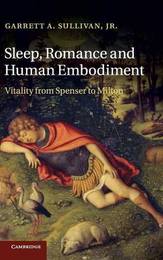
|
Sleep, Romance and Human Embodiment: Vitality from Spenser to Milton
Hardback
Main Details
Description
Garrett Sullivan explores the changing impact of Aristotelian conceptions of vitality and humanness on sixteenth- and seventeenth-century literature before and after the rise of Descartes. Aristotle's tripartite soul is usually considered in relation to concepts of psychology and physiology. However, Sullivan argues that its significance is much greater, constituting a theory of vitality that simultaneously distinguishes man from, and connects him to, other forms of life. He contends that, in works such as Sidney's Old Arcadia, Shakespeare's Henry IV and Henry V, Spenser's Faerie Queene, Milton's Paradise Lost and Dryden's All for Love, the genres of epic and romance, whose operations are informed by Aristotle's theory, provide the raw materials for exploring different models of humanness; and that sleep is the vehicle for such exploration as it blurs distinctions among man, plant and animal.
Author Biography
Garrett A. Sullivan, Jr is Professor of English at Pennsylvania State University. He is the author of The Drama of Landscape: Land, Property, and Social Relations on the Early Modern Stage (1998) and Memory and Forgetting in English Renaissance Drama: Shakespeare, Marlowe, Webster (2005). He has also edited numerous works, among which are The Cambridge Companion to English Renaissance Tragedy (with Emma Smith, 2010), Environment and Embodiment in Early Modern England (with Mary Floyd-Wilson, 2007), Early Modern English Drama: A Critical Companion (with Patrick Cheney and Andrew Hadfield, 2007) and The Encyclopedia of English Renaissance Literature (co-general editor with Alan Stewart, 2012).
Reviews'This is a major new study with wide ranging implications for a variety of early modern interests - in the contested category of the human, in the ecological place of the human body in relation to its environment, in the legacy of Aristotelianism against the advent of Cartesianism, and in the relations between epic and romance.' Gail Paster, Folger Shakespeare Library '... a scholarly, intelligent and provocative study that raises many important questions about the relationship between genre and content that are certain to invite further debate.' Richard A. McCabe, Milton Quarterly
|